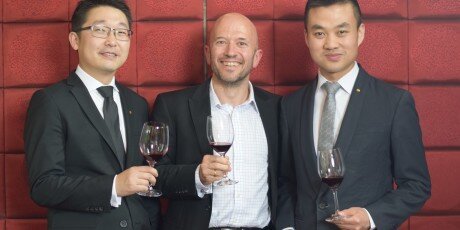The Wine Show: Ep 7 – A Question of Taste

If you’ve felt that the last couple of weeks have been missing a little something, you aren’t mistaken. The Wine Show has, for the last couple of weeks, had to exit stage right for summer sport. My uncoordinated self was dismayed, but all is now put to vinous right – The Wine Show is not only back but this next episode is a super double bill of Joe’s Eastern Adventures in China!
Although I have never been to China, it is very much on my wine radar. As Jancis Robinson wrote recently, China is now the world’s sixth largest wine producer and, according to market analysts employed by the Bordelais, it is also the world’s biggest market for red wine. It is a huge contemporary wine industry player and should be watched with interest by all in the future. One of the world’s most prominent wine merchants, Berry Brothers & Rudd, predicted in 2008 that the quality of Chinese wine will rival that of Bordeaux within fifty years.
Joe’s experience in cosmopolitan Shanghai attests that there is a thriving, appreciative wine scene in the country. The episode starts with Joe giving a wine tasting to local wine lovers at Ruby Red, a popular wine shop. What ensues is an enlightening portrayal of Old World tasting versus a different order of engaging the senses. Joe starts the tasting by pouring a classic Puligny Montrachet. Those of the group who are older and have been ‘classically’ trained how to taste, evoke the expected responses of ‘buttered toast’ and ‘minerality’. These same people also respond with the textbook answers of ‘sour cherry’ when Joe moves onto a Chianti Classico. Everyone in the room, whatever their level of knowledge, is dedicated to their commitment of tasting. They focus, with singular determination, on where the wine is made, where exactly it comes from and what other estates they should be looking out for. China’s way of learning is famous worldwide. However, when it comes to the younger generation, a different mode of learning is expressed. It reveals just as much about the West as well as China.
The older, more expert tasters talk in a way that’s familiar to people in the West. However, when Joe talks to a young man in his early twenties he reveals that he enjoys wine differently from his father. He’s less interested in just trying famous wines. He wants to try more diverse styles, and frankly can’t be bothered learning lots of Western tasting terms. When he tastes the Chianti Classico he doesn’t perceive balsamic notes. It tastes of soy sauce – a very specific type of soy sauce. The Puligny Montrachet does not remind him of buttered toast. It’s burnt rice. This evokes a much more profound question in regard to future markets. How and why do we describe wine the way we do? Why do the wines of the world have to be described and sold based on Western tasting terms and Western sensory experiences? Is it helpful for future consumers from different cultures? And is it just arrogant or ignorant to apply Western terms like balsamic to future Chinese wines?
This post first appeared on Great British Chefs in association with The Wine Show

